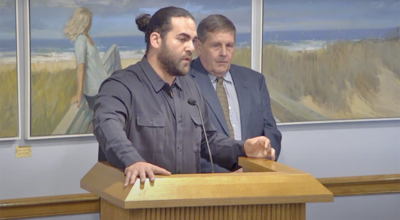NC death row inmate to serve life in prison, court rules
Published 8:15 am Saturday, August 15, 2020
|
Getting your Trinity Audio player ready...
|
By Bryan Anderson, Associated Press/Report for America
A man on death row in North Carolina will soon have his sentence reduced to life without parole, the state Supreme Court ruled on Friday.
Marcus Robinson is one of four inmates to initially get death penalty sentences reduced using the legal process outlined in the now-defunct Racial Justice Act.
The 2009 law allowed death row inmates to receive life without parole if they could prove through an appeals process that racial bias was the reason or a significant factor for their death sentence. The North Carolina General Assembly amended the Racial Justice Act in 2012 and then repealed the law the following year.
The Supreme Court ruled earlier this summer that the repeal of the law cannot be applied retroactively. This paves the way for more than 100 death row inmates to get the relief they sought while the 2009 law was in place.
In a dissenting opinion, Senior Associate Justice Paul Newby argued that the narrow 4—3 ruling in Robinson’s favor could soon apply to Quintel Augustine, Christina Walters and Tilmon Golphin, all of whom have pending cases with the state Supreme Court.
“This Court’s decision today would seem to control the outcome of these cases as well,” Newby wrote.
Cassandra Stubbs, who represented Robinson and serves as director of the American Civil Liberties Union’s Capital Punishment Project, called the court’s decision “a strong condemnation of racial bias in capital cases” and praised the majority of justices who decided to reduce Robinson’s sentence.
“I’m very pleased for him and his family that he will be safe from the threat of any additional proceeding and the threat of a death sentence,” Stubbs said.
Attorney General Josh Stein’s office said it is still reviewing the court’s decision.
The Cumberland County Superior Court had sentenced Robinson to death for the June 1991 slaying of 17-year-old Erik Tornblom. Robinson was 18 years old at the time. In 2012, he became the first death row inmate to successfully use North Carolina’s Racial Justice Act to lower his sentence to life without parole. His death sentence was then reinstated after the law was nullified.
The Supreme Court’s ruling on Friday written by Chief Justice Cheri Beasley reinstates Robinson’s life without parole sentence and argues he cannot face the death penalty again because he had already won his appeal under the Racial Justice Act.
“The question is whether we will hold onto a punishment that is unfair and discriminatory,” Stubbs said. “When you look at Marcus’s life, there’s no question he was not the worst of the worst and did not deserve the death penalty.”
READ ABOUT MORE NEWS AND EVENTS HERE.
RECENT HEADLINES:
Officials: Inmate stabs two officers in North Carolina prison





